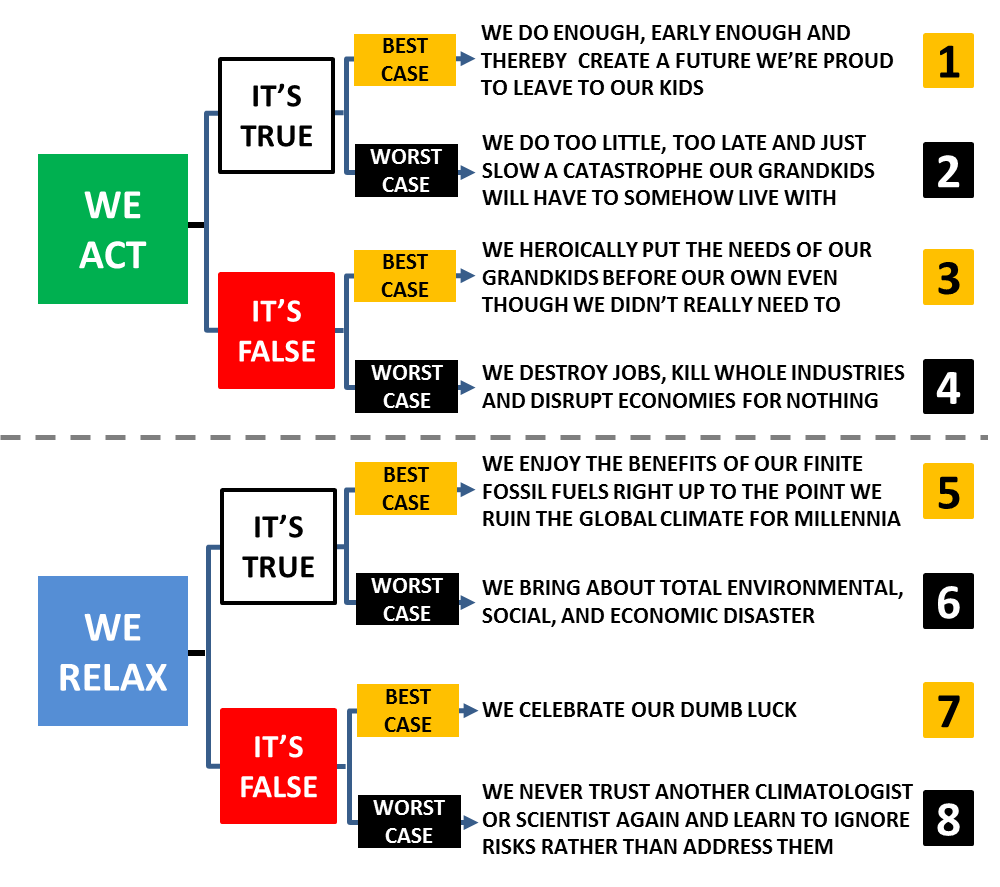Every decision-making tool takes the same first step: assemble all the information.
But what if you have to decide before all the data is in?
Take climate change; politicians won’t commit to action without complete and perfect proof, which they won’t get… until it’s too late.
So how do you decide what to do without information? By choosing the FUTURE you want and working backwards to discover what you must do to make it happen.
If we break the climate issue down to two options (ACT or RELAX) and two possibilities (climate change is REAL or FAKE) then consider two resulting outcomes (the BEST or WORST case scenarios) we get eight (2x2x2) FUTURES to choose from:

(Note this covers every aspect of the current ‘debate’ and then some: so far it’s been the disaster of future #4 verses the horror of future #6.)
Personally, I’d wish for #7 but it seems far-fetched, so I’d settle for #3 or #1 and my only shot at either of those is to ACT. Of course, that means risking futures #2 or #4, either of which is preferable to #6 (which is so bad it actually includes all of #4) and the only way to avoid that is to ACT.
So yeah, I’d risk destroying jobs and disrupting economies if it meant protecting my grandkids from potential environmental, social and economic disaster. Using this technique, you can (without perfect and complete information) make decisions you (and future generations) can live with.
So why can’t our politicians?
Because they’re so fixated on Who Is Right they’ve not realised Who Can’t Afford To Be Wrong.
Dave Isles
Concur with the analysis, Jason… but,if we act by doing something like an ETS, pat ourselves on the back, create new worldwide bureaucracies and a nice new business stream for emissions brokers, will this stop climate change in its tracks and return the world to the good old days when we had average temperatures each month and no great droughts, floods, fires, earthquakes, tsunamis, etc?
The media push would have people believe that doing away with coal mining and oil&gas exploitation will ‘save the planet’… the ‘models predict’ this….
looking at all of the factors in the I=PAT equation it is hard to accept that changing the % of CO2 in the atmosphere from ~0.035%to ~0.04% will trump all of the other factors in the human Impact equation.
Maybe we should get all of the human impact factors in perspective, and decide which ones need the most urgent attention.
relaxing/ doing nothing isnt an option, but spreading the action over the range of impact factors in proportion to their negative influences on humanity makes more sense to me.
cheers, Dave I
Jason
Yeah, I guess that’s the challenge of any problem with multiple, interconnected causes; they demand multiple, interconnected solutions, the kind that don’t lend themselves to T-shirts and soundbites. We prefer simple, one-application fixes and we love stories involving heroes, victims and of course, villains which might be why we do so badly at the kind of problems this century is made of. I think your last para hits the nail on the head; let’s tackle the causes we can control in order of their real impact.
dave isles
just to add a positive note, Jason.. lets focus on, be enthusiastic about the wide range of renewable energy sources that will warm, cool and drive our grandkids.. rather than spending our personal energy trying to punish the fossil fuel industry that has helped to deliver us all the affluence and way of life that we (‘westerners’) now enjoy. incentives for develepment of efficient and sustainable energy sources, not penalties for those who are now delivering us the comforts in which we indulge.. cheers, dave i